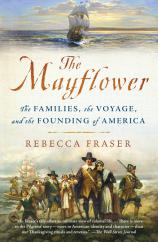The Mayflower: The Families, the Voyage, and the Founding of America
Review
The Mayflower: The Families, the Voyage, and the Founding of America
Every American schoolchild learns about “the first Thanksgiving,” when the Pilgrims who landed at Plymouth Rock came together with Native Americans in a remarkable show of tolerance and mutual assistance. Rebecca Fraser (THE BRONTES, THE STORY OF BRITAIN) has created an assiduously researched family saga that will expand our thinking about those two groups, who, for a storied while, occupied the same territory without enmity.
From England to Holland, back to England and thence to Massachusetts, Fraser follows the fortunes of the Winslow family. Edward Winslow and his wife Elizabeth, swept up in the Protestant Reformation, were among the 102 passengers aboard the Mayflower, a barely seaworthy old vessel, when it set sail for the New World in 1620. The crossing took two grueling months, the Pilgrims arriving in winter, giving the passengers no time to prepare crops for the following year. Curiously, though they brought books and bedding, the Pilgrims brought no seeds to their new Eden. Luckily, they were able to make contact with the people known as Massasoit, inclined towards kindness and willing to share their food --- and seed corn --- with the strange new beings. Edward Winslow, soon after setting foot on the largely unexplored continent, wrote that the local Indians had been “glad of any occasion to make peace with us.”
"...an assiduously researched family saga that will expand our thinking about [the Pilgrims and the Native Americans], who, for a storied while, occupied the same territory without enmity."
Fraser’s story follows the Winslow clan through three generations, revealing how much tumultuous change can happen in a relatively short span in an isolated realm where even the educated English were frozen in time, relying on the vagaries of weather and kindness of their fellow beings. As Fraser demonstrates, Edward Winslow proved to be a true statesman who befriended the Indians to the great benefit of both peoples. Surviving at first by trading furs for Indian food and Indian tracking skills, this hardy group of Pilgrims based their society on strict Protestant beliefs, the sparely written Mayflower Compact and an even simpler agreement signed with the Indians.
But in order to grow into a nation, the Winslows and their fellow settlers would gradually alter their principles in subtle ways as they founded complex settlements, forts and cities. The Winslows would find themselves at war with the once-friendly tribes. The Pilgrims would spurn the rights of obstreperous women like Anne Hutchison, condemned as a witch for her strongly held religious convictions, and would even oust the pacifistic Quakers, whose individualistic approach to spiritual truth marked them as "alarming.”
Still, as Fraser points out, the Winslows and others who came to America on the Mayflower were there to stay, not merely to take advantage. And the Native Americans who greeted them without immediate hostility still occupy the same region where their ancestors “saw a ship called the Mayflower appear over the horizon, and watched the Pilgrims, including Edward Winslow, alight.”
Reviewed by Barbara Bamberger Scott on November 10, 2017
The Mayflower: The Families, the Voyage, and the Founding of America
- Publication Date: November 5, 2019
- Genres: History, Nonfiction
- Paperback: 400 pages
- Publisher: St. Martin's Griffin
- ISBN-10: 1250108578
- ISBN-13: 9781250108579




